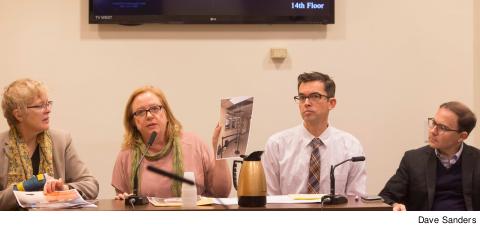“You don’t matter.”
That’s the message that dilapidated buildings, cracked floors and leaky pipes at CUNY send to a student, PSC President Barbara Bowen told the City Council’s higher education committee January 12. In a panel with PSC members, Bowen argued that the decay of buildings and delays in much needed repairs spoke to the systematic underfunding of the University. “That shows up most dramatically in the physical plant,” she said.
 |
REAL RISKS
PSC members had a united message for the council. Physical decay wasn’t merely unsightly or unpleasant. It posed safety and health risks to faculty, staff and students, and in many cases, directly interfered with learning. In some cases, it dissuades quality educators from coming to CUNY or encourages educators to move to other institutions.
“Regularly, some offices report temperatures above 90 degrees….Other offices are so cold employees wear coats and hats,” said City Tech-based HEO delegate Cindy Bink in her testimony, speaking of persistent heat and air conditioning system problems. “Sporadic and ongoing pipe bursting and water damage are a major concern. Some employees place garbage bags over their desks at night because flooding has often damaged student documents. Employees worry about breathing in mold spores because their offices have been flooded so often. A foul stench on a lower level floor reoccurs every time it rains. In one office, a plastic ceiling tile was designed to collect brown water from a permanent leak that could not be repaired,” testified Bink.
Lehman College PSC Chapter Chair Robert Farrell painted a similarly dismal picture: “Walls which were patched prior to President Barack Obama’s visit to Lehman last year are now bubbling again with water damage. The ceiling of our recital hall is snowing down in a fine dust onto its floor. Leaks are common…. A busted water pipe caused a power main to explode, resulting in a multi-building blackout for several days. Emergency funding has had to be secured to address the problem.”
City College biologist Christine Li, who has also served as the chair of the College of Liberal Arts and Science Faculty Council, reported that department chairs complained to her about peeling paint, mold and vermin, as well as other major problems. “Waiting seven minutes for an elevator was the norm, not the exception, making it difficult for students, and in particular, disabled students to make it to classes on time,” she said.
Members have reported rats on campus as well and, in some cases, water leaks have led to severe disruption in learning. Brooklyn College PSC Chapter Chair James Davis testified that a math professor told him that a water leak irreparably damaged some of his vital equipment and that the campus television studio was off limits because water leakage there posed an electrocution risk.
GROWING PROBLEM
CUNY administration officials testified that campuses have grown significantly in recent decades, making it more difficult for repairs to keep up with the rate of growth, and that for many campuses, especially those in Manhattan, spatial deficits make it difficult to erect new campus buildings.
Davis noted that administration officials have been responsive to faculty and student concerns. A social media campaign documenting disrepair at Brooklyn College using the hashtag #brokelyncollege which Clarion reported on in the fall, pushed the administration to address some issues, Davis said.
But as many members noted, even if campus administrators want to make repairs, they often lack the necessary funds, leaving problems to remain.
“Students feel the message being sent,” Davis said.

